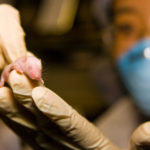
Bath additives ineffective for eczema
Pouring emollient additives into a bath does not add any benefit over the standard management practices of eczema, according to a new study. In the largest trial of emollient bath additives to date, Cardiff University reports four hundred and eighty two children were randomly allocated to two groups. One group was asked to use bath … Continue reading Bath additives ineffective for eczema

Stem cell study looking for people with Friedreich’s ataxia
Researchers at the University of Bristol are looking for people with an inherited neurological condition called Friedreich’s ataxia (FA) to take part in a study into whether a stem cell therapy could be a treatment for the condition. The University of Bristol reports the small, pilot study aims to recruit seven people to find out … Continue reading Stem cell study looking for people with Friedreich’s ataxia

Enigmatic gene crucial to healthy brain development
New research has shown how an unusual gene is needed for brain development in young mice. Since the human genome was first sequenced in 2001, scientists have puzzled over swathes of DNA that despite apparently lacking function are made into ribonucleic acid (RNA) by the cell. The University of Bath reports its scientists, along with … Continue reading Enigmatic gene crucial to healthy brain development

Pinpointing whose blood the vampire bat is drinking
A new method of screening vampire bat DNA could help tackle rabies thanks to a joint Danish and British study. The common vampire bat prefers to feed on the blood of domestic animals such as cows and pigs, risking transmission of pathogens such as rabies. Now a new study, led by the University of Copenhagen, … Continue reading Pinpointing whose blood the vampire bat is drinking

Buprenorphine mat be safer than methadone
The less commonly prescribed opioid substitute buprenorphine may be safer than methadone for problem opioid users, especially if used during the first month of treatment, according to a study by researchers from the University of Bristol, King’s College London, University of Manchester and Bristol Drugs Project, with implications for guidance on GP prescribing. The study, … Continue reading Buprenorphine mat be safer than methadone

11.5 million image kitchen dataset released
Computer science researchers at the University of Bristol have released EPIC-KITCHENS, a dataset filmed in thirty two kitchens across four cities. The University of Bristol reports the films, which include 11.5 million images, have been annotated with forty thousand action examples and half a million objects. This groundbreaking dataset will help machines to learn and … Continue reading 11.5 million image kitchen dataset released

Understanding the immunobiology of wild mammals
A team of British scientists, led by the University of Bristol, have made a significant step forward in understanding the immunobiology of wild mammals. The state of the immune system of wild animals is almost unknown. However, knowing this and knowing what affects the immune state of wild animals is important in understanding how infection … Continue reading Understanding the immunobiology of wild mammals

Healthy soil lifts animal weight
Managing soil by well designed grazing is key to an animal’s growth and wellbeing according to new research linking soil health, pasture value and sustainable production. Individual pastures on livestock farms yield surprisingly dissimilar benefits to a farm’s overall agricultural income, and those differences are most likely attributable to the varying levels of “soil health” … Continue reading Healthy soil lifts animal weight

New study reveals how networks are built
An intriguing feature of virtually all networks is that small structures, known as motifs, are found more often than would be expected. Understanding how these motifs behave like building blocks for networked systems was the focus of a recent study by the University of Bristol. The University of Bristol reports researchers from its Synthetic Biology … Continue reading New study reveals how networks are built

Protein could help after heart bypass surgery failure
A new £147,000 research project funded by Heart Research UK aims to help 50% of people who have had failed heart bypass surgery, saving them from further invasive surgery and potentially fatal heart attacks. The University of Bristol reports the project, led by Sarah George, Professor of Cardiovascular Signalling from the Bristol Medical School and … Continue reading Protein could help after heart bypass surgery failure








